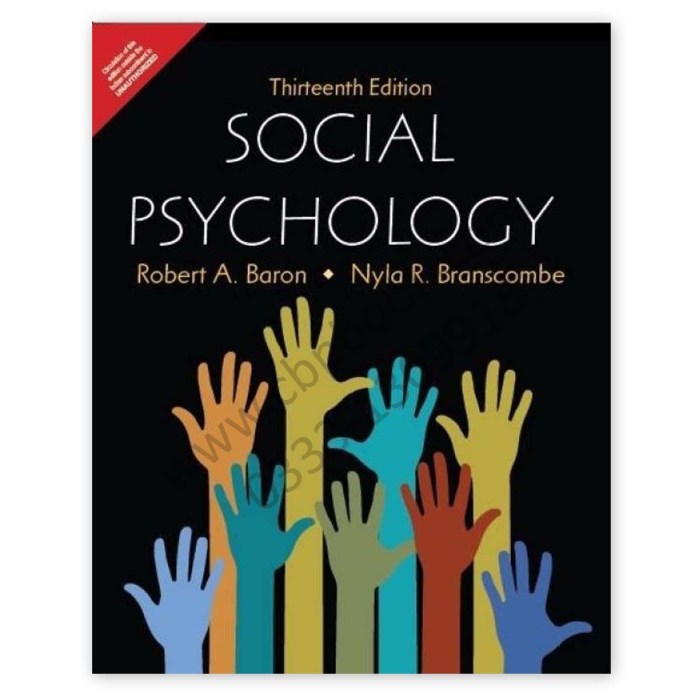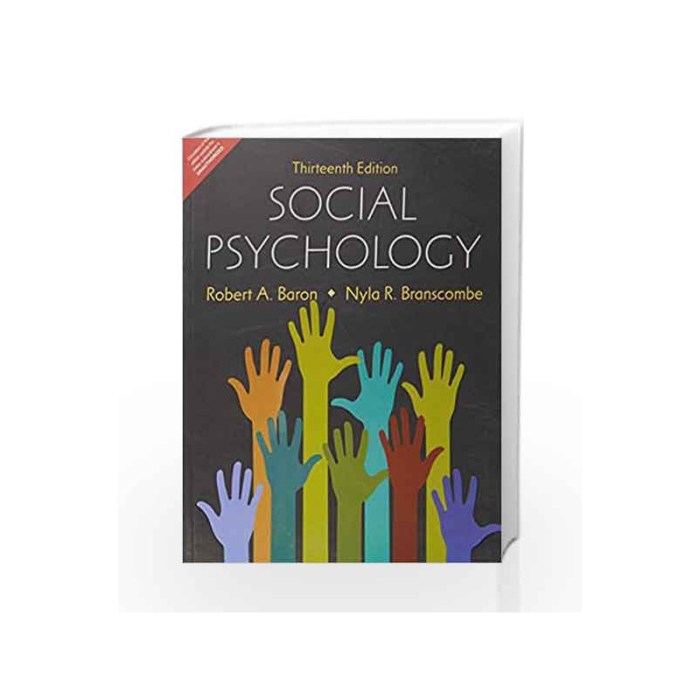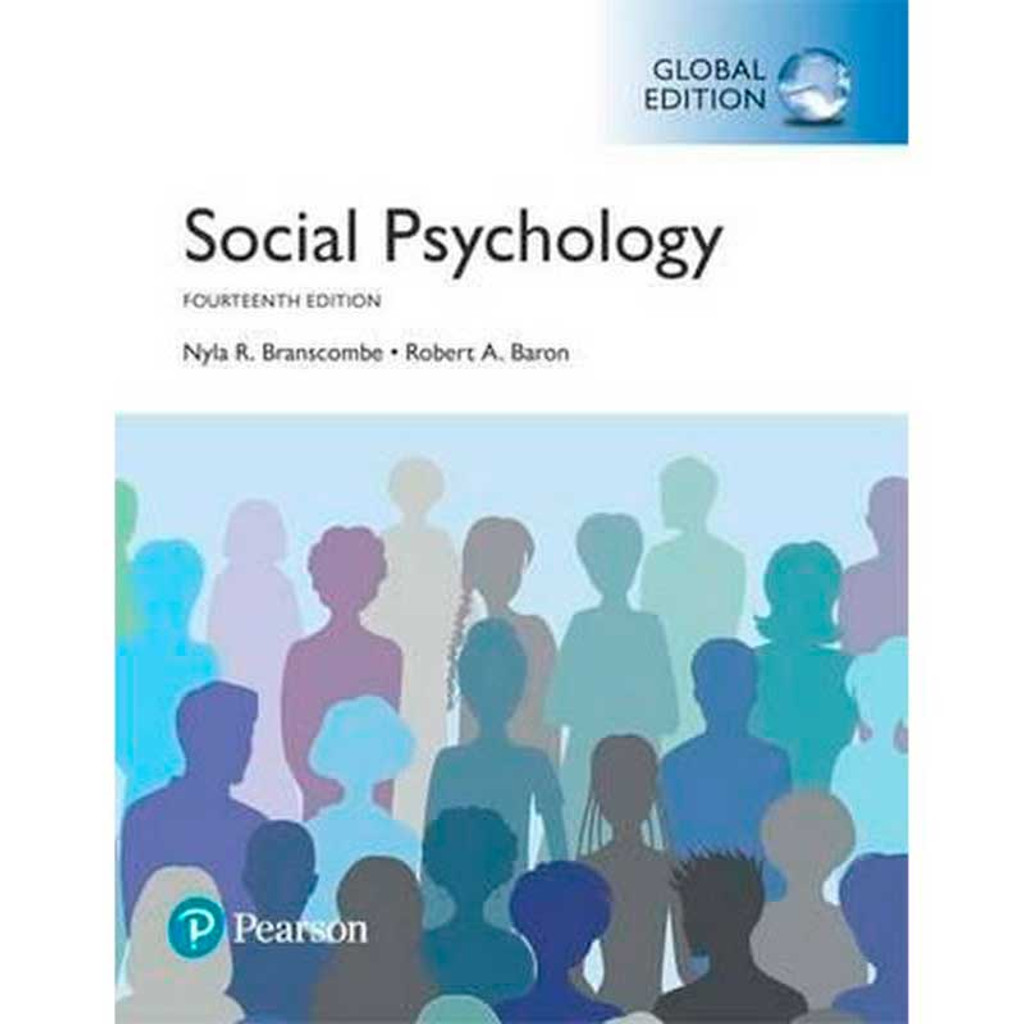Social psychology branscombe and baron, a subject that takes center stage in the field of psychology, beckons readers into a world crafted with scholarly precision and authoritative tone, ensuring a reading experience that is both captivating and distinctly original.
The contributions of Branscombe and Baron to social psychology are significant and far-reaching. Their research on prejudice, discrimination, and social identity has shaped our understanding of these complex phenomena and provided valuable insights for addressing them.
Social Psychology: The Contributions of Branscombe and Baron

Branscombe and Baron are two of the most influential social psychologists of the past few decades. Their research on prejudice, discrimination, and social identity has had a profound impact on our understanding of these important social issues.
Branscombe and Baron’s Theory of Prejudice: Social Psychology Branscombe And Baron

One of Branscombe and Baron’s most important contributions to social psychology is their theory of prejudice. Their theory argues that prejudice is a form of social cognition that is based on the perception of threat. When people perceive a group as threatening, they are more likely to develop negative attitudes and beliefs about that group.
Supporting Research
- Branscombe and Baron’s theory has been supported by a number of studies. For example, one study found that people who were exposed to negative stereotypes about a group were more likely to express prejudice against that group.
- Another study found that people who were led to believe that a group was threatening were more likely to support discriminatory policies against that group.
Branscombe and Baron’s Research on Discrimination
Branscombe and Baron have also conducted extensive research on discrimination. Their research has shown that discrimination is a widespread problem that can have a devastating impact on individuals and groups.
Types of Discrimination
- Branscombe and Baron have identified several different types of discrimination, including:
- Intentional discrimination: This type of discrimination occurs when someone intentionally treats a person or group differently based on their race, gender, or other group membership.
- Unintentional discrimination: This type of discrimination occurs when someone treats a person or group differently based on their race, gender, or other group membership, but they do not intend to do so.
- Institutional discrimination: This type of discrimination occurs when the laws, policies, or practices of an organization or institution create barriers for people of color, women, or other marginalized groups.
Impact of Discrimination
- Branscombe and Baron’s research has shown that discrimination can have a number of negative consequences for individuals and groups, including:
- Lower self-esteem
- Increased anxiety and depression
- Reduced educational and economic opportunities
- Increased risk of violence and victimization
Branscombe and Baron’s Work on Social Identity

In addition to their research on prejudice and discrimination, Branscombe and Baron have also conducted extensive research on social identity. Social identity refers to the part of our self-concept that is based on our membership in social groups.
Social Identity Theory
Branscombe and Baron have developed a theory of social identity that argues that people are motivated to maintain a positive social identity. This motivation can lead people to engage in a variety of behaviors, including:
- Social comparison: Comparing oneself to others in order to evaluate one’s own status.
- Self-categorization: Categorizing oneself as a member of a particular social group.
- In-group favoritism: Favoring one’s own social group over other groups.
Implications for Understanding Social Conflict, Social psychology branscombe and baron
Branscombe and Baron’s research on social identity has important implications for understanding social conflict. Their research suggests that social conflict is often driven by competition between different social groups. This competition can lead to prejudice, discrimination, and violence.
The Legacy of Branscombe and Baron
Branscombe and Baron are two of the most influential social psychologists of the past few decades. Their research on prejudice, discrimination, and social identity has had a profound impact on our understanding of these important social issues.
Challenges and Opportunities for Future Research
While Branscombe and Baron’s research has made significant contributions to our understanding of prejudice, discrimination, and social identity, there are still many challenges and opportunities for future research in these areas. Some of the most important challenges include:
- Developing more effective interventions to reduce prejudice and discrimination.
- Understanding the role of social identity in promoting social harmony.
- Examining the intersection of prejudice, discrimination, and other forms of oppression.
Question Bank
What are the key contributions of Branscombe and Baron to social psychology?
Branscombe and Baron have made significant contributions to social psychology, particularly in the areas of prejudice, discrimination, and social identity.
How does Branscombe and Baron’s theory of prejudice explain the causes and consequences of prejudice?
Branscombe and Baron’s theory of prejudice posits that prejudice is a product of social categorization and ingroup favoritism. They argue that individuals tend to favor members of their own group and discriminate against members of other groups.
What are the different types of discrimination identified by Branscombe and Baron?
Branscombe and Baron have identified various types of discrimination, including individual discrimination, institutional discrimination, and structural discrimination.
How has Branscombe and Baron’s research on social identity helped us understand the role of social identity in shaping our thoughts, feelings, and behaviors?
Branscombe and Baron’s research on social identity has demonstrated that social identity is a powerful force that shapes our thoughts, feelings, and behaviors. They have shown that individuals tend to conform to the norms and expectations of their social groups.